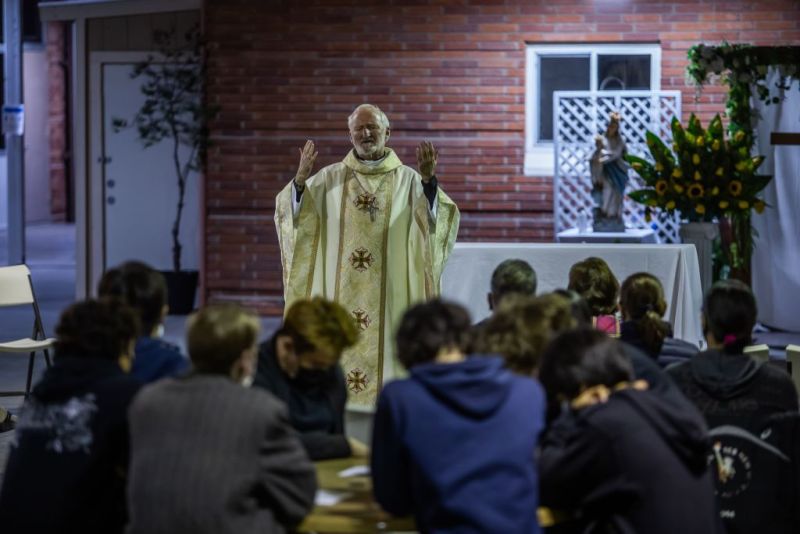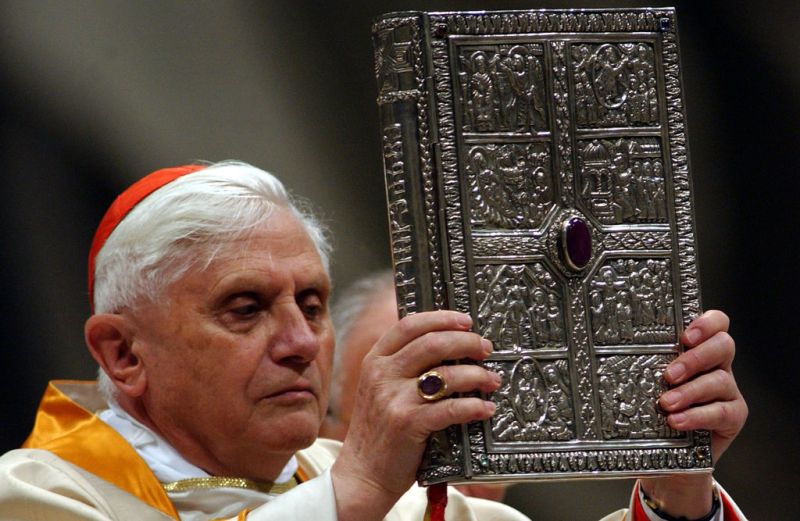
UPDATE: Murder investigation underway in shooting death of LA Auxiliary Bishop O’Connell
 Bishop David O’Connell leads a non-denominational memorial service to provide a space for community members who have lost loved ones in 2020 at the St. Cornelius Catholic Church in Long Beach, California, on Nov. 14, 2020. / Apu Gomes/AFP via Getty Images)
Bishop David O’Connell leads a non-denominational memorial service to provide a space for community members who have lost loved ones in 2020 at the St. Cornelius Catholic Church in Long Beach, California, on Nov. 14, 2020. / Apu Gomes/AFP via Getty Images)
Washington, D.C. Newsroom, Feb 19, 2023 / 13:47 pm (CNA).
The shooting death of Los Angeles Auxiliary Bishop David G. O’Connell Saturday is being investigated as a homicide, authorities have confirmed.
“This incident is being handled as a murder investigation,” the Los Angeles County Sheriff’s Department (LASD) said in a statement Sunday. No additional details were released.
“We learned early this morning from the Los Angeles County Sheriff’s office that they have determined that the death of Auxiliary Bishop David O’Connell yesterday was a homicide. We are deeply disturbed and saddened by this news,” Los Angeles Archbishop José Gomez said in a statement Sunday.
“Let us continue to pray for Bishop Dave and his family. And let us pray for law enforcement officials as they continue their investigation into this terrible crime,” Gomez added. “We ask Our Blessed Mother Mary to intercede and be a mother for all of us in this moment of sadness and pain.”
The shooting happened around 1 p.m. local time Saturday inside a home in the 1500 block of Janlu Avenue in Hacienda Heights, Los Angeles County, the sheriff’s department said. Property records show an address on that block as being associated with O’Connell, but CNA could not immediately confirm local media reports that identified the location as O’Connell’s residence.
Sheriff deputies called to the scene for a medical emergency found O’Connell suffering from a gunshot wound to his torso. He was pronounced dead at the scene, the LASD said.
A native of Ireland, O’Connell, 69, ministered to immigrants, the poor, and victims of gang violence for 45 years in the South Los Angeles area. Pope Francis made him a bishop in 2015.
O’Connell’s friends and fellow bishops reacted with shock and sadness to the news of his death.
I received last night the devastating news that my dear friend, Bishop David O’Connell, has died. Bishop Dave and I were ordained auxiliary bishops for the Archdiocese of Los Angeles seven years ago. pic.twitter.com/GWrgLY1hPX
— Bishop Robert Barron (@BishopBarron) February 19, 2023
Among those to comment on social media was Bishop Robert Barron of Winona-Rochester, Minnesota, who was ordained an auxiliary bishop of Los Angeles with O’Connell in 2015.
“From the moment I met him, I was struck by his goodness, kindness, prayerfulness, and simplicity of heart,” Barron tweeted.
“Throughout the course of my years in the LA Archdiocese, Bishop Dave was a constant source of support, encouragement, and good humor,” Barron continued.
“He dedicated his priesthood to serving the poor. I can honestly say that he was one of the most Christ-like men I’ve known. May he rest in peace.”
Linda Dakin-Grimm, an immigration lawyer in California, tweeted a photo of O’Connell with one of her young clients.
This is L.A. Aux. Bishop David O’Connell, with one of my young clients. Bishop Dave, who was shot to death in his home today, was there for every child and family I have represented. Always. Helping, supporting and generally being the face of Jesus for me and many many others. pic.twitter.com/zdtEN25DGE
— Linda Dakin-Grimm (@LindaDakinGrimm) February 19, 2023
“Bishop Dave, who was shot to death in his home today, was there for every child and family I have represented. Always,” she tweeted. “Helping, supporting and generally being the face of Jesus for me and many many others.”
Sister Norma Pimentel, the director of Catholic Charities of Rio Grande Valley known for her work with migrants on the Texas-Mexico border, also shared a photo of O’Connell on Twitter, calling him “truly a man of God.”
Bishop David O’Connell truly a man of God! Your sudden departure has left us extremely sad.may you rest in peace Bishop O’Connell. ♥️ pic.twitter.com/YZumDZkqZ5
— Norma Seni Pimentel (@nspimentel) February 19, 2023
The Los Angeles County Sheriff’s Department posted a statement on Facebook Sunday addressed to the grieving South LA community. “We can only imagine how the community is suffering because of this senseless murder. Bishop O’Connell was a guiding light for so many, and his legacy will continue to live on through the community that he helped build,” the statement said.
“Please know that you are not alone in your grief and that @lasdhq is here to support you. Our thoughts and prayers are with you, and we are working diligently to seek those responsible.”
Anyone with information about this incident is encouraged to contact the Los Angeles County Sheriff’s Department’s Homicide Bureau at (323) 890-5500.
Those who prefer to provide information anonymously may call “Crime Stoppers” by dialing (800) 222-TIPS (8477), use their smartphone by downloading the “P3 Tips” Mobile APP on Google Play or the Apple App Store, or by using the website http://lacrimestoppers.org.





